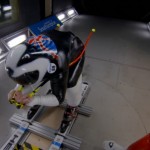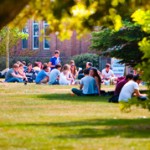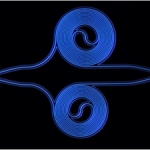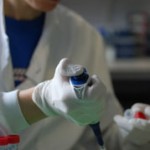Read about the major media appearances for the University during the period 21 January – 20 February 2014. During that time, media appearances related to the University created 85.8 million opportunities to view and hear stories via print, broadcast and online outlets. The advertising equivalent value of these appearances in print and via commercial broadcast media reached £155,898.00.
Below are stories which reached national and international audiences:
 Skeleton Gold
Skeleton Gold
The University’s part in supporting Lizzy Yarnold’s gold-medal winning performance in the skeleton bob at the Sochi Games achieved widespread coverage in UK national media – The Daily Mail, The Daily Telegraph, The Times and BBC online – with specific references to graduates James Roche and Rachel Blackburn who designed and delivered Amy Williams’ sled ‘Arthur’ in 2010 as well as Lizzy’s sled ‘Mervyn’ this year. A blog by James was also published on the UKTI website.
 The Jump on Channel 4
The Jump on Channel 4
The R.J. Mitchell wind tunnel featured in Channel 4’s new series The Jump watched by 1.7 million viewers. The wind tunnel was used to put competitors, including Olympic rowing champion Sir Steve Redgrave and investigative journalist Donal Macintyre, through their paces in the Speed Ski section of the competition.
Watch the wind tunnel in The Jump here (the first appearance is at eight minutes in).
 Flooding comments
Flooding comments
Robert Nicholls, Professor of Coastal Engineering, spoke to Sky News about coastal flood defences in response to the storms and flooding experienced across the UK. His comments were also reported on local commercial radio stations across the country including Wave 105, City Talk FM Liverpool, Key 103FM Manchester and CFM Radio Carlisle.
A new study by Professor Nicholls’ predicts that climate change threatens to cause trillions in damage to world’s coastal regions if they do not adapt to sea-level rise. The study featured around the world including articles in The Australian, French Tribune, Scientific American, Zee News (India), Red Orbit (USA), Newsroom America and many more.
Read our press release here.
Professor of Physical Geography, David Sear was interviewed by LBC Radio about river dredging and what can be done to help minimise the swelling of rivers. He’s also commented on the same issue via the BBC News Channel (focusing on the Somerset Levels), ITV Meridian, BBC South, Sky News (online) and the Voice of Russia.
 Railways and climate change
Railways and climate change
William Powrie, Professor of Geotechnical Engineering and Dean of Engineering and the Environment, spoke to BBC TV South Today about his research into the impact of climate change on railway infrastructure. The interview was featured on the BBC News website.
Watch a YouTube video about the University’s work to improve railway design here.
 Here comes the sun
Here comes the sun
University research revealing how sunlight can reduce the risk of heart attacks and stroke by reducing blood pressure through altering levels of nitric oxide in the blood resulted in widespread media interest both nationally and internationally. Articles have appeared in The Daily Telegraph, The Independent, Daily Mail, and on the front page of The Daily Express. Additional coverage included NBC News, ABC News, Newstrack India, Huffington Post and The Toronto Sun among many science and health news websites.
Read our press release here.
 Silicon photonics coverage
Silicon photonics coverage
The Engineer, New Electronics and science websites reported on a new £6m project, led by Professor Graham Reed from ORC, to bring silicon photonics to the mass market.
Read our press release here.
 Getting academics moving
Getting academics moving
m.c. schraefel Professor of Computer Science and Human Performance, contributed a blog for the Guardian HE Network on getting academics moving to improve health and wellbeing.
 Research changing cancer treatment
Research changing cancer treatment
Peter Johnson, Professor of Medical Oncology, was interviewed by BBC Radio 4’s Today programme about the ways new research can help the fight against cancer.
Listen to the interview here.